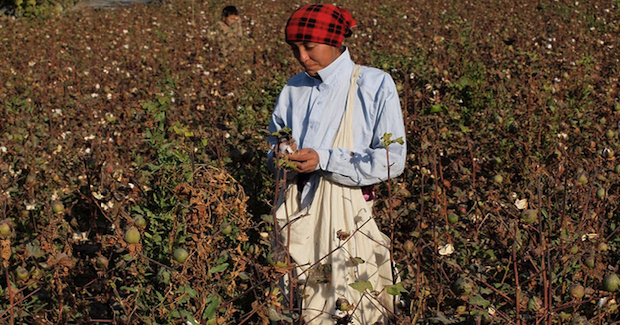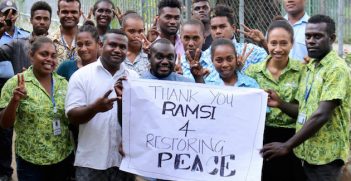Slavery and Elections in Uzbekistan

This year the International Day for the Abolition of Slavery comes on the eve of presidential elections in Uzbekistan, which continues to have one of the world’s highest rates of forced labour. After 25 years of iron-fisted rule by the late Islam Karimov, on 4 December the Central Asian republic will elect its first new president since achieving independence.
White gold
Karimov was Uzbekistan’s first and only president since achieving independence in 1991, and he ruled for more than 25 years. His government forcibly required Uzbeks to farm cotton, sustaining the billion-dollar industry that continues to underpin the country’s economy. Uzbeks receive little or no pay for farming cotton and refusing to work means public harassment, possibly being beaten, having your property rights extinguished and facing criminal charges. Moreover, profits are collected by the rich elites, further entrenching a cycle of poverty. This situation has caused Uzbekistan to have one of the world’s highest rates of modern slavery, with approximately 1.2 million slaves, according to the Global Slavery Index 2016.
For many years, the Uzbekistan cotton industry has been under scrutiny for its practices and treatment of workers. Subsequently, many global retailers have pledged to reject all Uzbek cotton and now only a handful of countries accept the product. Significantly, however, these include China and Bangladesh—both of which play a major role in global supply chains.
However, more companies are trying not to source directly from Uzbekistan, and directors are under increased pressure from foreign governments to review all levels of supply chains. For example, legislation such as the UK’s Modern Slavery Act stipulates that commercial organisations must avoid slavery and human trafficking in their businesses and supply chains. These measures have diminished the Uzbek cotton industry, but patterns of forced labour continue to exist.
A new era?
The upcoming presidential election coincides not only with a weakened cotton industry, but also with falling oil prices and general economic uncertainty in the region. Will this perfect storm of events herald in a new era of change for Uzbekistan?
Unfortunately, it seems not.
Karimov’s likely successor is Shavka Mirziyoyev, the country’s prime minister and acting interim president. Already Mirziyoyev is displaying some of the same characteristics of the previous president by acting as interim president in apparent disregard of constitutional requirements designating the chairman of the senate as interim president.
Although international observers have been asked to review the election process, which officially has four candidates running for office, all signs point towards Mirziyoyev becoming the next president.
Mirziyoyev has largely stayed out of the limelight, but is viewed as a “clone” of Karimov, having being groomed for the role. There is also the risk that he will implement tougher policies. Human rights observers have reported that Mirziyoyev’s own approach to policy has included imposing strict punishments on local authorities who didn’t achieve cotton production targets. Others have reported on his hot temper and alleged propensity for violence. One allegation is that during his time as governor of the Dzhizak region, Mirziyoyev beat a local teacher to death for refusing to send his students to work in the cotton fields.
Mirziyoyev does, however, appear to be more susceptible to international pressure than Karimov (who rarely travelled abroad and ruled behind closed doors). In 2012, Mirziyoyev (as prime minister) responded to international outcries and signed a decree banning children under the age of 15 from working in the cotton fields. Field observers confirmed that following this decree, the number of young children working in the fields decreased.
Unfortunately, it appears that one form of modern slavery was simply replaced with another. New policies were introduced to force adults, particularly targeting university students, teachers and health care professionals, and teenagers aged 15 to 17 to work in the fields. Professionals were left with the choice of either paying others to work for them by taking out loans, or do it themselves. This dramatically reduced the quality of educational and health services at a huge social cost to the country.
Modern slavery continues to exist in Uzbekistan largely due to its capability to generate profits. Moreover, the country’s leaders continue to rely on feudalistic systems of governance. Now, with economic uncertainty facing the region, profit margins and production targets will be under pressure to continue to current practices.
The international response
International development organisations, including the World Bank and UNICEF, have come under fire for financing programmes in Uzbekistan that fund the cotton industry, without addressing the underlying forced labour issues. For example, in September 2013, the Asian Development Bank pledged US$220 million (A$296 million) to modernise the irrigation system. The bank was criticised by Human Rights Watch for bolstering a system that uses forced labour.
However, some programs such as the European Union’s Annual Action Program 2016 do focus on the root causes of forced labour. This initiative is supporting third party monitoring of child and forced labour in the cotton harvest and aims to promote capacity building of state and non-state institutions to address systemic labour issues. Further programs have introduced machinery and technology to assist with cotton harvesting in order to reduce reliance on human labour. Time will tell whether these programs are successful and are able to facilitate sustainable models for economic growth.
The presidential election will be decided on 4 December. Regardless of which president is appointed, the international community must do more than simply boycott the Uzbek cotton industry. Rather, more must be done to influence and encourage the new government to build a sustainable economy that supports human rights. The new government must be one that does not need to rely on the labour of over one million slaves, and is able to be held accountable for its actions.
Shaeron Yapp is a lawyer who has worked in the UK and Australia, most recently as in-house commercial counsel for the BBC and as a consultant for the Walk Free Foundation.
This article is published under a Creative Commons Licence and may be republished with attribution.





